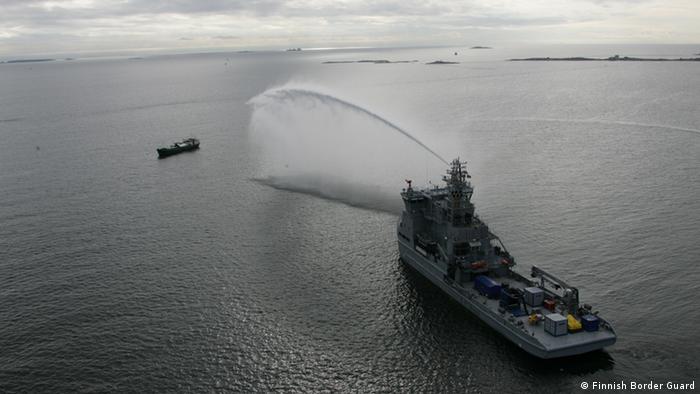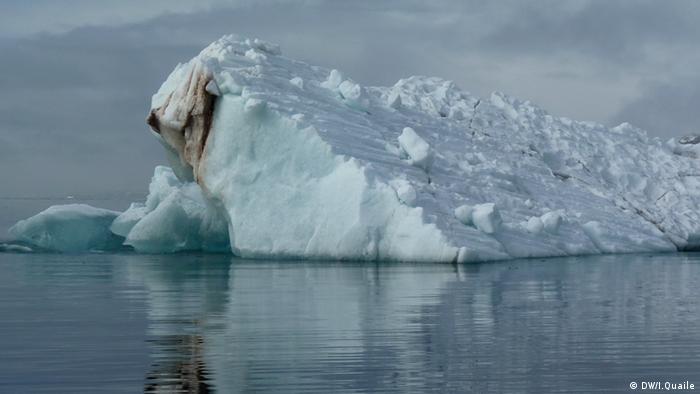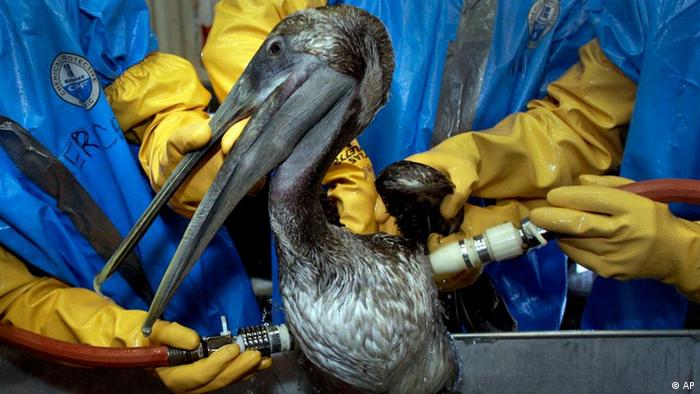Arctic experts are calling for more research as British energy giant BP and Russian oil company Rosneft eye new offshore drilling opportunities in the fragile north.
Drilling for oil offshore is risky anywhere, but conditions in the Arctic make this kind of work particularly complicated. John Farrell is a marine geologist and the director of the US Arctic Research Commission. In an interview with DW, he explained that drilling or spill cleanup in the Arctic is complicated by extreme cold, strong winds, breakaway ice blocks and, in the winter, limited daylight.
 Clean-up crews train in places like the Baltic sea and are unprepared for Arctic challenges
Clean-up crews train in places like the Baltic sea and are unprepared for Arctic challenges
Farrell also pointed out that the sea ice is melting rapidly, making it extremely difficult to build a comprehensive understanding of the physical, chemical, and biological environment. This means it is almost impossible to track damage to the environment as Arctic oil drilling initiatives expand. "With the diminishment of the Arctic sea ice extent, and the warming up there, there is no baseline ecosystem anymore," Farrell said.
Opening the Arctic
Scientists and environmentalists have turned their focus northwards following an announcement on October 22 that British oil giant BP was selling its Russian holdings to Rosneft, the Russian state oil company. Under the terms of the deal, Rosneft will become the biggest publically traded oil company in the world, with BP controlling 20 percent. For environmentalists, the key component here is that the new deal will give the British firm access to Arctic reserves through Rosneft.
 With Russia's oil reserves depleting, the Arctic presents the promise of billions of barrels within Russia's northern boundaries
With Russia's oil reserves depleting, the Arctic presents the promise of billions of barrels within Russia's northern boundaries
According to the US Geological Survey, as much as 13 percent of the world's undiscovered oil reserves lie beneath the rapidly melting northern ice cover. Rosneft already has drill sites in the Arctic but they are now exploring how to do it offshore. It's a marriage of convenience: BP will bring its expertise to the table and Rosneft has licenses.
In Russia, oil explorers are eyeing the Kara Sea. This water is so remote that the Soviets used it as a dumping site for nuclear waste for more than 25 years. There are 17,000 containers of radioactive waste and a sunken nuclear submarine on the ocean floor. The nuclear waste and the potential for a polar oil spill has prompted environmental action group Greenpeace to seek a ban on arctic drilling.
The environmentalists aren't alone in their concern. Last month, French multinational oil and gas company Total warned against drilling in the Arctic. The company said the risks were too high and an accident would be detrimental to the company's image.
Learning from experience
Russian environmental auditor Alexei Bambulyak works in the field of Arctic exploration in Norway and Russia. He told DW that research still needs to be done before drilling can start. He explained that there is a lack of knowledge about the Kara Sea, compared to what drilling experts know about bodies of water in more southern regions.
 This Brown Pelican was rescued after the oil spill in the Gulf of Mexico
This Brown Pelican was rescued after the oil spill in the Gulf of Mexico
"We know some general patterns, but we cannot confirm we know enough to really do proper assessments of environmental risks and environmental impact," he said. "As we move further to the north and to the east in the Arctic, from the Barents Sea eastward, then knowledge is decreasing."
But he added that having BP at the table, may actually improve the safety standards in Arctic oil exploration. BP's image was seriously damaged after the 2010 Deepwater Horizons oil spill off the Gulf of Mexico, the worst offshore oil spill in American history. That episode is far from over: there are still more than 200 million gallons of oil in the water. But Bambulyak said this will make the company far more cautious in its work in the future.
"They're knowledge has extreme value. We can expect that when they go to the Arctic, they will have a precautionary approach," Bambulyak said. "And we can hope for more investment in environmental research. I look positively to what happened, but we should wait and see." dw de
Comments